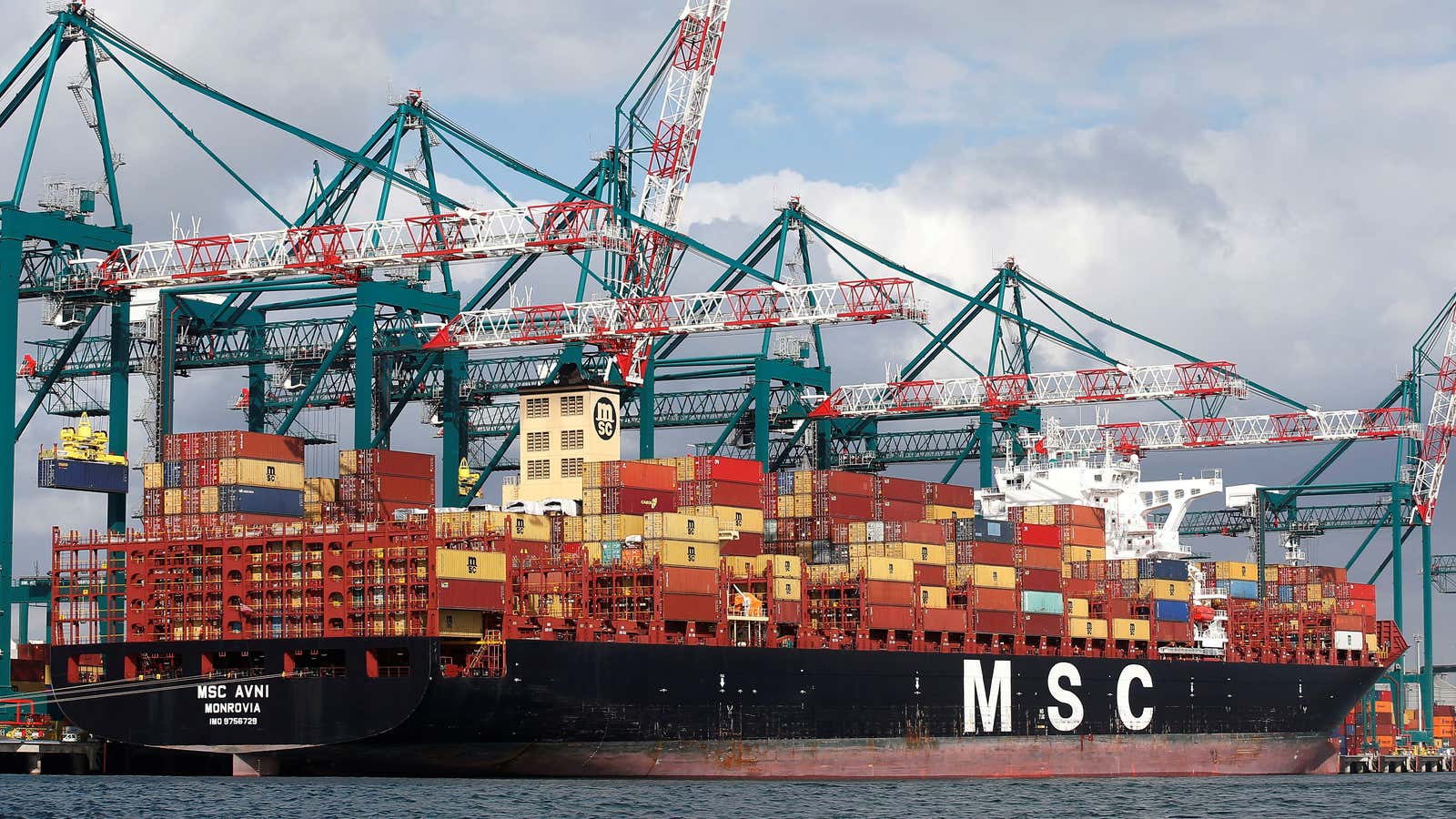Mediterranean Shipping Company (MSC) has unseated Maersk as the world’s largest shipping line by container capacity, according to data from the shipping analytics firm Alphaliner. The shakeup ends Maersk’s 25-year reign as the undisputed champion of cargo shipping.
MSC reached that milestone today (Jan. 5) when Alphaliner’s daily updating database recorded that MSC now owns or charters enough ships to carry the equivalent of 4,284,728 shipping containers, narrowly edging out Maersk’s total capacity of 4,282,840 containers. Each 20-foot shipping container can carry the equivalent of 400 flat-screen TVs (or 48,000 bananas).
“It will undoubtedly have hurt in Copenhagen to let go of the number one spot,” wrote Simon Sundboell, the founder of shipping intelligence platform eeSea, in an email. “It has been an identity and pride for Maersk—and Denmark—for many years to be the largest container shipping company in the world.”
The two shipping lines have made different bets on the future of their industry. Maersk has decided to shift its focus away from shipping and toward more profitable lines of business, like air freight, trucking, warehousing, operating port terminals, and selling logistics software. The company aims to reinvent itself as a one-stop shop for every step of the supply chain.
In a March press release, Maersk wrote that “the company has taken a strategic decision to change course…Maersk has pivoted around next-gen technologies, big data, and innovation to transform into an end-to-end integrated logistics company.” Maersk didn’t immediately respond to a request for comment.
Meanwhile, MSC has doubled down on its strategy of building out a fleet of mega-ships that can deliver cargo at the lowest possible cost. “MSC has invested significantly in new and very efficient ultra-large vessels,” the company said in an emailed statement. CEO Soren Toft, who MSC poached away from Maersk in 2019, added, “size isn’t an objective for us…Growth, profitability, and supporting customers are what have driven us, and what will continue to drive us forward.”
MSC leads in containers, not fleet size
MSC has surpassed Maersk on one key metric: the number of containers it can carry on the ships it owns and charters. This is the most important measure of a shipping line’s size because it means that MSC can move more cargo than Maersk can.
But MSC’s dominance isn’t clear-cut. For one thing, Maersk still owns more shipping capacity than MSC does. MSC makes up the difference by temporarily chartering cargo ships from other lines. MSC is looking to close that gap by ordering more new ships. MSC has nearly 1 million 20-foot equivalent units (TEU) worth of new cargo ship space on order, compared to 255,000 TEU for Maersk.
Maersk also owns and charters more ships than MSC—although that isn’t necessarily an advantage. MSC’s strategy has been to buy the biggest container ships available because they can operate more efficiently than smaller ships. While larger ships cost a bit more to operate, they can carry far more cargo, so if they’re fully loaded their routes will be more profitable than the routes of smaller ships. MSC’s ships carry, on average, about 6,600 TEU, compared to Maersk’s average of 5,800 TEU, according to Quartz’s analysis of Alphaliner data.
MSC’s new spot atop the leaderboard for shipping capacity reflects the investments that the world’s largest shipping lines are making with the billions of dollars in profits they’ve recorded during the pandemic. As supply chains normalize in 2022 and beyond, time will tell whether Maersk’s decision to invest in land-based logistics or MSC’s mega-ship strategy proves prescient.
Sundboell, the eeSea founder, said MSC might still decide to follow Maersk’s footsteps. The company can change its strategy fast since it is privately owned and tightly controlled by a core group of executives in Geneva. “MSC will certainly be looking towards Maersk and evaluating whether they should move in the same direction—especially now with Soeren Toft as CEO,” he wrote. “Don’t underestimate their ability to move fast and decisively in one direction, should they decide on such a strategy.”
Learn more about the auto shipping company from G/O’s Media partner:
Quartz is not involved in creating these articles but may receive a commission from purchases through its content:
Auto Shipping Calculator
Cost Of Auto Shipping
Car Shipping Containers
Cheap Vehicle Shipping
.
